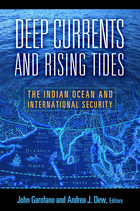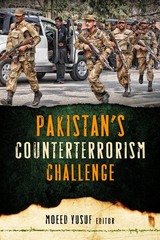
The Indian Ocean region has rapidly emerged as a hinge point in the changing global balance of power and the geographic nexus of economic and security issues with vital global consequences. The security of energy supplies, persistent poverty and its contribution to political extremism, piracy, and related threats to seaborne trade, competing nuclear powers, and possibly the scene of future clashes between rising great powers India and China—all are dangers in the waters or in the littoral states of the Indian Ocean region.
This volume, one of the first attempts to treat the Indian Ocean Region in a coherent fashion, captures the spectrum of cooperation and competition in the Indian Ocean Region. Contributors discuss points of cooperation and competition in a region that stretches from East Africa, to Singapore, to Australia, and assess the regional interests of China, India, Pakistan, and the United States. Chapters review possible “red lines” for Chinese security in the region, India’s naval ambitions, Pakistan’s maritime security, and threats from non-state actors—terrorists, pirates, and criminal groups—who challenge security on the ocean for all states.
This volume will interest academics, professionals, and researchers with interests in international relations, Asian security, and maritime studies.

Pakistan, which since 9/11 has come to be seen as one of the world’s most dangerous places and has been referred to as “the epicenter of international terrorism,” faces an acute counterterrorism (CT) challenge. The book focuses on violence being perpetrated against the Pakistani state by Islamist groups and how Pakistan can address these challenges, concentrating not only on military aspects but on the often-ignored political, legal, law enforcement, financial, and technological facets of the challenge.
Edited by Moeed Yusuf of the US Institute of Peace, and featuring the contributions and insights of Pakistani policy practitioners and scholars as well as international specialists with deep expertise in the region, the volume explores the current debate surrounding Pakistan’s ability—and incentives—to crack down on Islamist terrorism and provides an in-depth examination of the multiple facets of this existential threat confronting the Pakistani state and people.
The book pays special attention to the non-traditional functions of force that are central to Pakistan’s ability to subdue militancy but which have not received the deserved attention from the Pakistani state nor from western experts. In particular, this path-breaking volume, the first to explore these various facets holistically, focuses on the weakness of political institutions, the role of policing, criminal justice systems, choking financing for militancy, and regulating the use of media and technology by militants. Military force alone, also examined in this volume, will not solve Pakistan’s Islamist challenge. With original insights and attention to detail, the authors provide a roadmap for Western and Pakistani policymakers alike to address the weaknesses in Pakistan’s CT strategy.
READERS
Browse our collection.
PUBLISHERS
See BiblioVault's publisher services.
STUDENT SERVICES
Files for college accessibility offices.
UChicago Accessibility Resources
home | accessibility | search | about | contact us
BiblioVault ® 2001 - 2024
The University of Chicago Press









